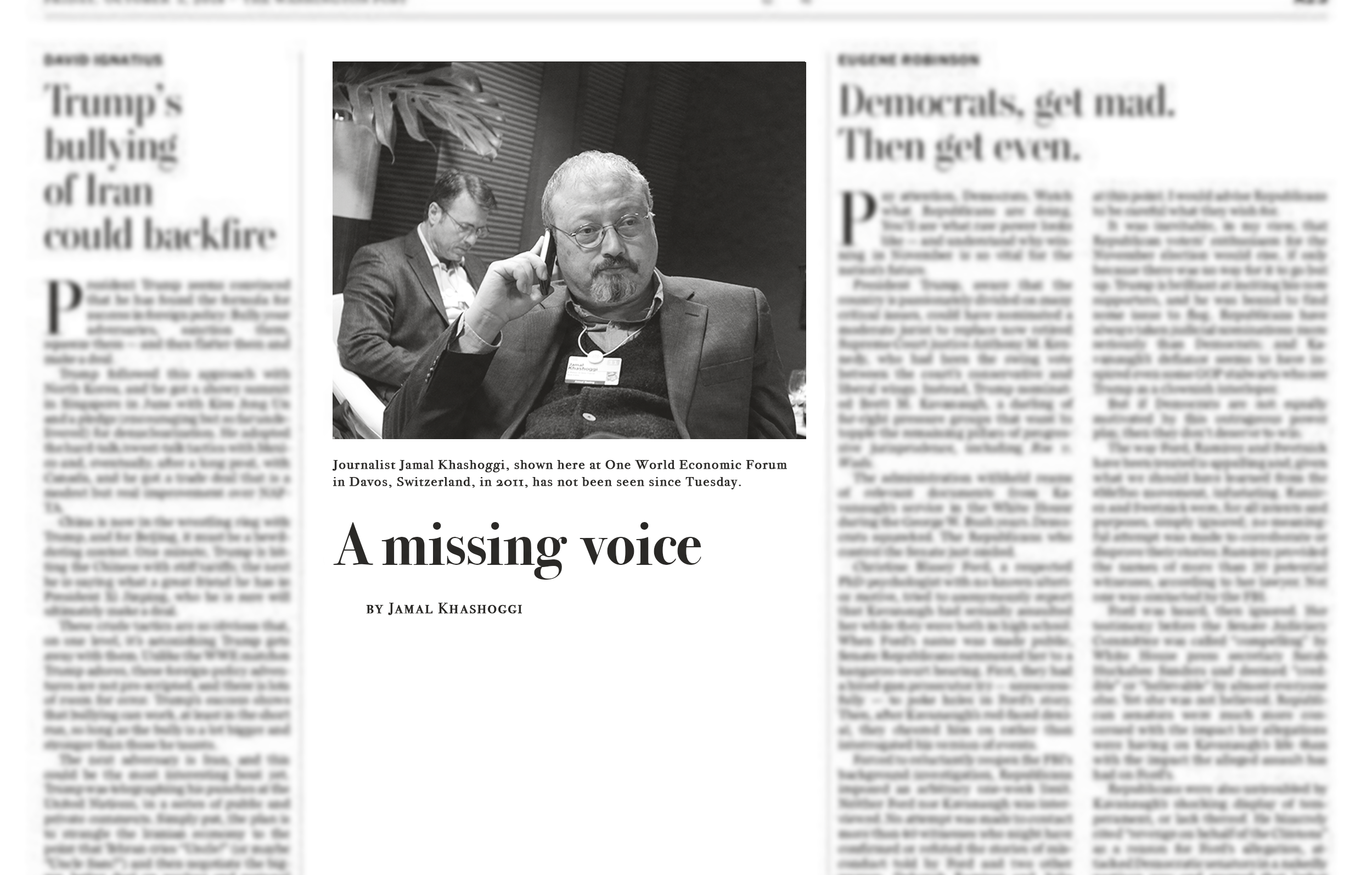HONORING
Jamal Khashoggi and Karen Attiah
In 2017, Washington Post Global Opinions editor, Karen Attiah, recruited Saudi expatriate and journalist, Jamal Khashoggi, as a columnist. Khashoggi held the Kingdom of Saudi Arabia accountable, and one year later, he was murdered in the Saudi consulate in Istanbul.
Attiah has demanded justice and called for protection of journalists worldwide, leading the outcry that the free press will not be silenced and has founded a fellowship in his honor.

Jamal Khashoggi (Posthumous)
WASHINGTON POST JOURNALIST
A selfie taken by Jamal Khashoggi on his first visit to the Washington Post in 2017.
Born in Medina, Jamal Khashoggi was one of the most prominent Saudi journalists of his generation, with a career that spanned nearly 30 years. Khashoggi earned a journalism degree at Indiana State University and returned to Saudi Arabia to work for Arab media outlets before making his mark as a foreign correspondent covering Algeria, Sudan, the Middle East and Afghanistan, where he became renowned for his interviews with Osama bin Laden. Khashoggi was part of the Saudi establishment and cared deeply for his home country, but wanted freedom of speech for its citizens.
In 2017, Khashoggi was recruited by Global Opinions Editor Karen Attiah as a columnist for The Washington Post. He had gone into self-exile that summer, moving to the U.S. because of his fear of being arrested at home. In his first column, Khashoggi wrote, “When I speak of the fear, intimidation, arrests and public shaming of intellectuals and religious leaders who dare to speak their minds, and then tell you that I’m from Saudi Arabia, are you surprised?”
Khashoggi continued to write about the crackdown on critical voices in his home country. In his words,
“To do otherwise would betray those who languish in prison. I can speak when so many cannot. I want you to know that Saudi Arabia has not always been as it is now. We Saudis deserve better.”
On October 2, 2018, Khashoggi was murdered inside the Saudi consulate in Istanbul. After denying it for weeks, Saudi Arabia indicted 11 people in the killing, including members of the Crown Prince’s entourage.
Jamal Khashoggi is survived by his fiancee, his children (with ex-wife Rawia al-Tunisi) Salah, Abdullah, Noha, and Razan, and three grandchildren.
“
My gut feeling, just knowing the things Jamal had told me about how the royal family had been putting pressure on him, putting pressure on his family, to get him to stop writing... I started to fear the worst. It’s certainly the worst moment of my professional life. The idea that we’re forever connected in this way is unreal.”

Karen Attiah
WASHINGTON POST GLOBAL OPINIONS EDITOR
Karen Attiah’s prominence grew in October 2018 when Jamal Khashoggi, her colleague and friend, went missing in Istanbul. As soon as she heard about his disappearance, she felt the worst had happened. Days later, she ran his column space blank with the title "A Missing Voice", and then learned with the rest of the world that he had been murdered inside the Saudi consulate.
Attiah has advocated for justice for Jamal Khashoggi, and has called for the U.S. president to acknowledge the role of the Saudi government in his murder.
Born in Texas to a Nigerian-Ghanaian mother and a Ghanaian father, Karen Attiah earned a B.A. in Communication Studies at Northwestern University, then won a Fulbright Scholarship to study in Accra, Ghana. She obtained an MA in International Affairs from Columbia University before joining the Washington Post, where she writes on issues relating to race, gender, and international politics.
Karen Attiah on Jamal Khashoggi’s disappearance. Washington Post Live











